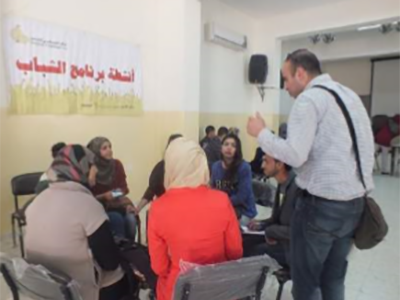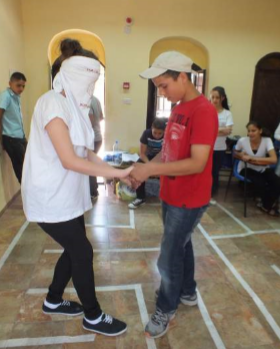
Background
The Palestinian Counseling Center, a non-governmental organization, has been responding to issues such as increased school dropout, early marriage, and child labor since its establishment in 1998. From 2011-2014, the focus shifted to youth resilience, and the PCC developed a program titled the Youth Empowerment Program (YEP).
Identify the community problem/goal to be addressed and what needs to be done.
Palestinian youth constantly struggle with their individual and national identities, and are at risk of being alienated within their society and becoming increasingly violent due to social and economic factors. Without proper intervention, Palestinian youth face the risk of developing a myriad of psychosocial problems. To combat this, The YEP targets youth between the ages of 15-22—who are most at risk—and focuses on building resilience by decreasing factors that may have negative influences. The program develops young people’s ability to make decisions and plan for the future, which increases their sense of self-worth and identity. In order to improve the psychological well-being of youth, which would in turn increase their productivity and their ability to become active members in their communities, the program’s aim is also to increase the youth’s sense of empowerment and improve their coping skills.
Assess the level of the problem or goal.
In 2011, a survey on violence was carried out by the Palestinian Central Bureau of Statistics. The results indicated that 20.8% of youth (19.4% male, 33.2% female) were exposed to at least one type of violence caused by their surrounding environment and own communities. Around 31.4% of them were exposed to psychological violence, 38.7% to physical violence, and 1.1% to sexual assault. Further research by the PCC indicated that a sense of identity and self-worth positively affect young people’s mental health. In order for youth to be able to make decisions and plan for the future, it was imperative to provide them with skills to adapt to the surrounding context.
Describe the prioritized groups to benefit and those implementing the intervention.
The program allowed for a minimum of 120 youth to be enrolled, however when additional funding was provided the number can grow (in 2013, there were around 180 participants). The age group was 15-22 years, which was considered to be the most at-risk. The program targets youth who are currently in school/living in Nablus or Jerusalem, and who have at least one of the following problems:
- divorced parents
- imprisoned parents
- drug problems
- family problems
- exposure to violence
- low socioeconomic status
The youth identified are not necessarily those with low grades but instead are those facing difficult living conditions.
Program sessions were led by a team of social counselors from the PCC, as well as youth university volunteers. These youth volunteers were recruited and intensively trained for a 3-day time period in order to prepare them for hands-on practical experience and theoretical approaches in working with youth and youth issues. In addition, they were trained by a clinical psychologist to develop the skills to co-facilitate sessions with program staff, and are supervised and guided on a month-by-month basis for support and preparedness purposes.
A team of four individuals on average (including the program coordinator) is responsible for implementing the program with youth enrolled in the YEP every school year.
Set goals and objectives for what "success" would look like.
Goals
- to develop young people’s sense of self-worth and identity, which includes their ability to make decisions and plan for the future
Objectives
- To empower youth in marginalized areas to adopt alternatives to violence
- To develop the resilience of the youth in order to be able to deal with difficult life situations
- To raise parents’ awareness about the needs of youth and ways of empowering them
Specify the core components and elements of the intervention.
The YEP was developed based on the extensive experience of the PCC. Its implementation and evolution was guided by various psychological theories, including:
- Erikson’s psychosocial theory of development, which “considers the impact of external factors, parents and society on personality development from childhood to adulthood”. This theory was implemented during sessions where the focus was on finding one’s identity.
- Kurt Lewin’s theory of force field analysis, which emphasizes the interaction between the individual and his/her environment. This theory was utilized during sessions where there was focus on teaching youth that they are surrounded and affected by their environment and in return they need to positively influence this environment.
Identify the mode of delivery through which each component and element of the intervention will be delivered in the community (e.g., workshops for skill training).
Youth-recruitment phase
While recruiting youth for the program, multiple methods were used in order to target participants. Educational institutions and community centers aided the PCC in identifying the youth that fit the criteria of the target group. In this way, 60% of youth were recruited via schools and 30% of youth were recruited with the help of community centers. Additionally, 10% of youth were recruited through referrals and parents. After the youth were identified, the PCC would either directly visit them in their homes to inform them about the program, or the youth would visit the PCC directly and learn about the YEP from there. The final selection is made from those who are most at risk who fit the criteria.
Implementation phase
Over the course of a school year, 24 group sessions in total are held once a week, encompassing role playing, brainstorming activities, video screenings, interactive activities and group work. The first session is a needs assessment of the group to determine members’ needs and help inform future sessions. The remaining sessions revolve around the concepts of empowerment, ways to address psychosocial problems, expressive arts and group management.
The groups are formed in coordination with local community centers; with an average of 12 young people (mixed age and gender) participating in the sessions, which focus on the following topics:
- Stages of growth: The youth’s ability to communicate and negotiate; traits of the youth’s age group
- Resilience: confidence-building and developing youth’s strengths
- Uniqueness as individuals
- How societal norms and attitudes shape character
- How to express emotions, and alternative ways of doing so
- Changes during adolescence
- Acceptance of the ‘other’
- Rights and responsibilities, including obstacles to attaining rights/how to overcome them
In addition to the youth sessions, once-a-month group sessions are offered to parents who wish to participate and stay informed about the program and the progress of their children. Topics of these sessions include ways in which parents can communicate with their children, as well as understand and deal with their needs. For both youth and parents who prefer individual sessions to discuss their own cases, they are referred to a clinical psychologist who is part of the PCC counseling service.
Besides the sessions, The YEP also offers youth opportunities at recreational activities. This provides youth with a safe space to spend time with each other in a non-formal setting.
Indicate how you will adapt the intervention or "best practice" to fit the needs and context of your community
In order to ensure the most inclusive environment for participants, the PCC takes multiple aspects into consideration.
During the recruitment phase, the program implementers aim to have an equal number of male and female participants. During the program, discussion topics include gender equality and attitudes towards gender roles. This in turn allows the program to promote gender equality and the rights of women.
Youth with disabilities and members of minority and ethnic groups (ex: Palestinian of African or gypsy descent) are invited to participate in group sessions without discrimination.
Implement the intervention, and monitor and evaluate the process (e.g., quality of implementation, satisfaction) and outcomes (e.g., attainment of objectives).
The below results are based on the evaluation in Jerusalem (Nabulus results not included), and the evaluation method is based on an assessment form that is given at the beginning and at the end of the intervention.
Two of the specific objectives for the project up until 2014 were to empower youth to adopt alternatives to violence, as well as develop their resilience to be able to deal with difficult life situations in marginalized areas
Results of the evaluation for ‘alternatives to violence’:
- 46.9% indicated improvement in their ability to express themselves
- 56.7% indicated a better understanding of the other and accepting others, including those from different faiths, which was a milestone, as religious belief often played a major role in preventing acceptance.
- 58% expressed a firmer understanding of their physical and psychological changes
Results of the evaluation of ‘ability to deal with difficult life situations’, conducted during one of the workshops relating to that issue:
- 14 of 15 participants expressed gaining new knowledge as a result of the workshop, particularly with regard to identity, planning for the future and alternative ways of dealing with problems
- 9 of 15 participants expressed gaining new information that helped them address their problems
- 11 of 15 participants expressed gaining new tools to help them solve their problems
A post-intervention test was also conducted on 59 parents about awareness-raising activities that empower them to address the needs of children. The results are as follows:
- 89.7% indicated that they gained new information as a result of the lectures
- 76.4% indicated that information gained will help them to deal with difficulties that they face
- 94.8% indicated that skills gained during sessions will help them solve their problems
Youth are a powerful force for change in society, however they need to be equipped with the necessary life skills in order to help them make that change. Having demonstrated that, despite their problems, the youth exhibit a high degree of motivation for improvement and change, the PCC acknowledges the importance of the program and is taking steps toward expanding its reach to other cities in the State of Palestine. An external evaluator will also be requested to assess how effective the program is, and offer recommendations for enhancing it over the course of the next five years, as part of the effort the PCC is making to ensure that the program continues.
The program has not yet been replicated, however the PCC has developed a program manual for anyone who is interested in following the YEP model.
Adapted from the Youth Empowerment Program: Palestinian Counseling Center.
Contributed by Leah Soweid, American University of Beirut, Intern with the Community Tool Box.




